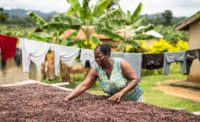ofi (“olam food ingredients”), a global business in natural and sustainable food ingredients and solutions, has announced its first public sustainability targets for 2030 across its supply chain in Turkey, where 70 percent of the world’s hazelnuts come from.
With a focus on eliminating child labor and improving working conditions for thousands of seasonal migrant workers, Hazelnut Trail also offers more transparency for consumers as the shift to plant-based diets continues to gather momentum.
Ashok Krishen, CEO of ofi’s nuts platform said: “Ever since ofi started working in Turkey nearly a decade ago, it’s been clear that unsafe working conditions and child labor are among the most pressing issues facing the sector. In this time, ofi, together with our customers and partners, including the Fair Labour Association, International Labor Organization, and Save the Children, has supported over 20,000 hazelnut farmers and workers with agronomy, labor rights, and community services.”
In 2018, the business set a first for the hazelnut and Turkish agricultural sector by introducing labor contracts for seasonal migrant workers, with minimum wage guarantees and legal working hours.
Krishen adds: “Our closeness to farmers is key to creating products with the strong provenance and sustainability impact that consumers crave. Our new strategy now challenges us to do more. And we need new partners to help us solve challenges and unleash more value for the people and communities behind our hazelnuts.”
Customers, NGOs and government bodies can partner with ofi on a range of activities to support mutual sustainability goals. From community projects like opening a summer school for children of migrant workers or building a school library, to sponsoring health-visits for female workers or gender equality training for farmers.
Starting with safe and decent work, Hazelnut Trail also consists of commitments around education, diversity, and climate action to ensure that by 2030:
- 100 percent child labor monitoring and remediation in managed programs
- 100 percent of farmers are trained on gender equality and labor rights
- 50,000 farmers are trained on Good Agricultural Practices (GAP)
- Soil analysis is conducted for 10,000 farmers to optimize fertilizer use
- 80 percent of all ofi hazelnut volumes—direct and indirect—are traceable
Overseeing these goals, Burcu Turkay, global sustainability manager of ofi’s nuts platform said: “By setting targets and sharing program and footprinting data via our insights platform AtSource, we can give our partners a window into supply chain challenges and reassure customers that their pralines, spreads, pastes, milks, and other hazelnut products not only taste great, but are also helping to support rural communities.”
A spokesperson from the Fair Labor Association, which has audited ofi’s sustainability programs since 2013, added: “ofi has proven to be a reliable partner in collaborations over the past decade, supporting efforts to increase understanding of working conditions on hazelnut farms in Turkey. The business’s commitment to change is clear. ofi’s education, engagement, training, and community investment have resulted in measurable improvements that have reduced child labor and improved worker recruitment and employment practices.”
Earlier this year ofi launched Cashew Trail, its sustainability strategy for the cashew supply chain, as well as targets for its Russian dairy operations and its first sustainability impact report for cocoa. A first update for coffee will be published in Q1 of 2022, closely followed by sustainability strategies for almonds and spices in 2022. All sustainability targets are aligned with the UN’s Sustainable Development Goals.
To find out more about Hazelnut Trail, click here.
.png?1634827748)






